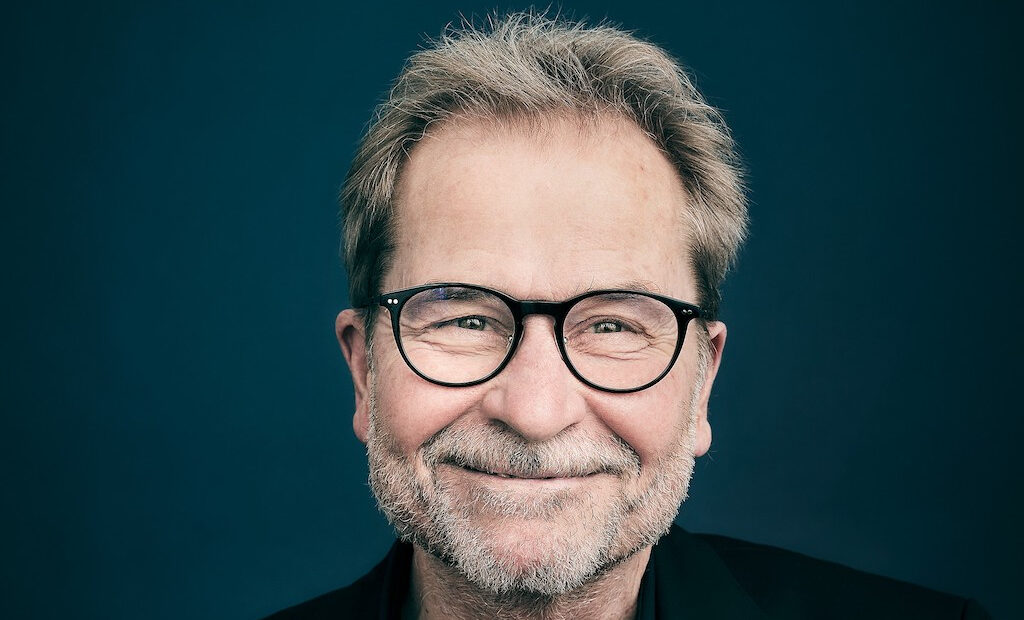Rimini: An interview with director Ulrich Seidl

Ulrich Seidl is a director who doesn’t mince words – or images. Be it through documentary or fiction, many of the stigmatised subjects tackled in his work involve the freedom people experience in secret spaces in their homes (In the Basement) or lowering their inhibitions on vacation (sex tourism in Paradise: Love, trophy hunting in Safari). Location also proves a vital element in Seidl’s latest drama. Rimini follows has-been Schlager star Richie Bravo, who relocated to the Italian coast, where he desperately clings to the last remains of his career. A handful of fans brave rain and gloom to travel to the beach town in winter to see their idol perform – for the right price, they can even spend a night in his house, or in his bed. It is a story about dreams for sale, about keeping up pretences, but also about getting back up again after falling.
The Upcoming spoke to the Austrian filmmaker about influences behind his unprettified directorial decisions and about his own personal idea of beauty.
It’s quite unusual to see a typical seaside resort without any sun and covered in fog. What was the idea behind showing Italy from this unflattering angle?
I find the place Rimini, or in general the Adriatic, actually much more beautiful in the fog and the rain in the off-season. When the bars and hotels are closed, when the beaches are empty – that atmosphere is inspiring to me. I don’t see beauty at the beach in summer, when thousands of people lie on their loungers, under their umbrellas, and there is no space left.
It was a longstanding idea of mine to shoot a film in this atmosphere, but I didn’t know which one. Then, when the story of Richie Bravo developed, I thought about setting it there because it related to the solitude the character has. I am also interested in the contrast between the songs that he sings: his songs are about desire – for love, for partnership – and about happiness. That is always related to the sun, to romance, the sea, and he sings it at a time where there is none of that.
What other cities did you consider as possible locations before deciding upon Rimini?
None. There is this fan tourism – this really exists – that fans of a Schlager singer get on a bus to go to the south of Europe in the off-season to spend a few days with their idols. There are, of course, a few possibilities on the Adriatic. But I went to Rimini immediately because I was there as a child, on a seaside holiday with my parents. I wanted to see it and I found perfect locations for this film, so I decided very fast. Fellini had nothing to do with my choice.
There is a sense of the tourists being on a pretend holiday, as they visit Richie, who in turn is affecting a career, yet the film feels very honest. How did you approach this complicated characterisation?
The film takes place at a time in his life where Richie knows his career, his success is over, but maybe doesn’t want to believe it – or he tries to be who he was. This is, to me, an interesting character as a human being. It’s much more interesting to talk about failure, about trying to overcome failure; I wouldn’t know what to say about a successful pop star. But Richie Bravo isn’t just not successful, he lives above his means. No matter how much he earns, he will never have money: he’s an alcoholic, he gambles. Still, he believes and he tries, he fights for something and that is what makes him likeable.
Another important aspect to his character is that, as a singer, he is honest. He doesn’t sing for the money – he sings about something he believes in, he is truthful and expresses himself. This is why the songs work, and why people believe him. It’s not schmalzy, he sings from conviction. Richie considers himself someone who gifts dreams to people.
It feels like the only place where he can keep up the illusion is his house, the Villa Bravo. Is this why you wanted it to fall into the hands of other people?
The starting point for the villa was the idea that here we have a character who has no more money left, so he is forced to rent out his villa to his fans, who then can live out the illusion of living in the villa of their idol. But if you look at it from the outside, it’s apparent that it is desolate – you know there is no money here. And all the images on the walls are from the past, from his glory days.
Also, in the intimate scenes, the characters are dressed up to the point of it functioning as a costume, like they are each playing a part.
Well, if you arrange a meeting for sex, you wear lingerie – this is normal. These people don’t meet in a restaurant and the evening develops organically. It is a date with the intent to have sex, and they dress appropriately.
With Richie Bravo, the costumes he wears are pure show; what he wears corresponds to his role as a performer. He is someone who fell out of time: his hair, his outfit – it is a very specific type. His fans are also equally elderly – there are no younger listeners of his music. As such, the costumes are an important part.
The coat he always wears – the seal fur coat, it’s real seal – the actor Michael Thomas found at a flea market. I think it was perfect for the role. I loved seeing him wear it in the winter – just a T-shirt and the coat over it. To me, it was also very reassuring that Michael Thomas came up with it. It showed how close he was to the role, how well he understood who he would inhabit – a crucial contribution.
What were your musical influences to create Richie Bravo?
The people who wrote the songs for this film are real Schlager experts: Fritz Ostermayer und Herwig Zamernik wrote all the lyrics, composed the music. I am not an expert, but I was confronted with Schlager music since I was a child because it was on the radio at my parent’s house. In my youth, German Schlager was always present in hit parades alongside pop music, the Beatles and others. It is something that accompanied me in some way.
I am interested, and have always been interested, in people who listen to Schlager. I have sometimes used it in my films – in a scene in which someone does household chores, irons, for instance, there is Peter Alexander. It is the right atmosphere, because what a person listens to is just right for that person.
Even though the film is set in Italy, it says much more about Austrian culture. What was the reasoning behind not featuring any Italian characters more prominently?
Well, the construction of the film is about an Austrian family. Both sons – the whole project was a script for two stories, about two sons, Richie Bravo and his younger brother, who lives in Romania… so their family home is in Austria, the older brother is in Italy, the other one in Romania. Both brothers wanted to get as far away from their parents’s house as possible, because they wanted to find themselves abroad, rediscover themselves. This is how it was construed and how the film was shot. Out of the Richie Bravo, the Rimini story, then one film developed. But there is the second film about his brother in Romania that will come out. Also, you can say it’s two films about three men – the father and his two sons – and the connecting element is that their past catches up with each of them. The father is haunted by his Nazi past, Richie by his daughter and Ewald, the younger brother, too, has a past that will catch up with him.
Selina Sondermann
Rimini does not have a UK release date yet.
Read our review of Rimini here.
Read more reviews from our Berlin Film Festival 2022 coverage here.
For further information about the event visit the Berlin Film Festival website here.

























Facebook
Twitter
Instagram
YouTube
RSS